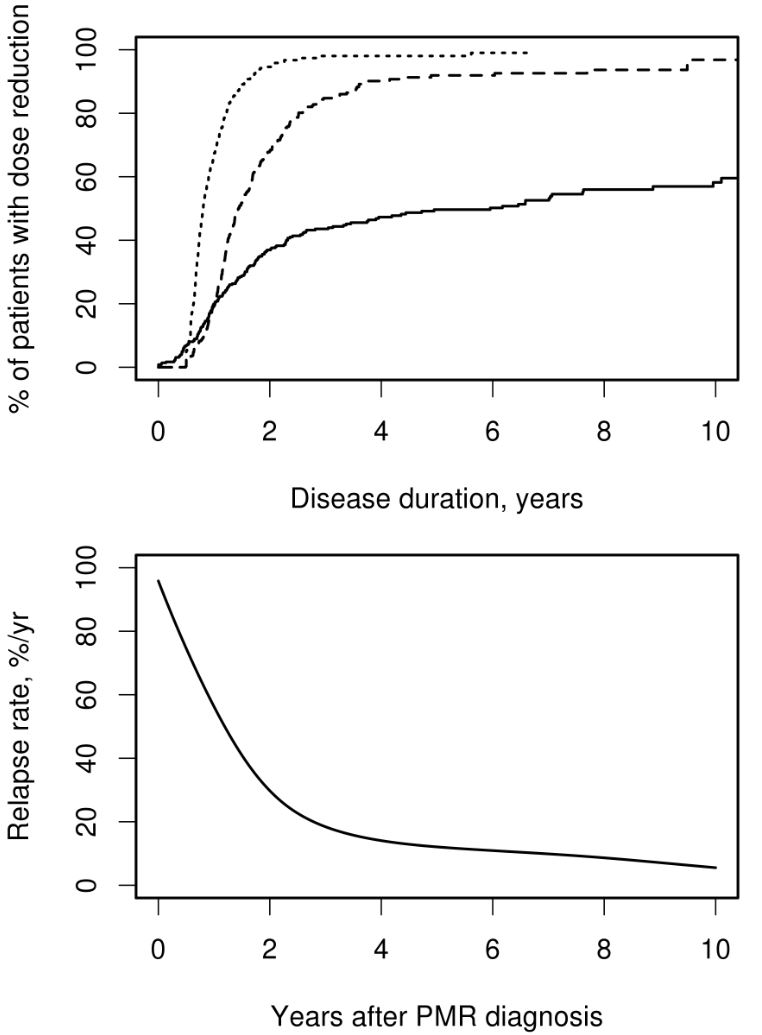Session Information
Session Type: ACR Poster Session A
Session Time: 9:00AM-11:00AM
Background/Purpose:
To investigate the use of glucocorticoids (GC) and related adverse events (AE) in a long-term, geographically-defined cohort of patients with polymyalgia rheumatica (PMR).
Methods:
Using a population-based inception cohort, details of GC therapy were abstracted from medical records of all patients diagnosed with PMR in 2000-2014. Age- and sex-matched comparators without PMR were identified from the same underlying population. Cumulative and daily dosage of GC, rate of disease relapse, occurrence of GC-related AE, and rate of GC discontinuation were analyzed.
Results:
The study included 359 patients with PMR and 359 comparators. The median time to taper below 5mg/day for 6 months was 1.44 years (95% confidence interval [CI]:1.36-1.62), while the median time to permanent discontinuation was 5.95 years (95%CI:3.37-8.88). GC dosage permanent discontinuation (solid line), reaching <5 mg/day for 6 months (dashed line), and reaching <10 mg/day for 6 months (dotted line are depicted in Figure 1, top panel. Relapse rates according to time after PMR diagnosis are shown in Figure 1, bottom panel. The mean cumulative dose of GC at 2 and 5 years was 4.0 grams (g) (standard deviation [SD] 3.5g) and 6.3g (SD 9.8g), respectively. The mean daily dose of GC at 2 and 5 years was 6.1 mg/day (SD 7.6) and 7.2 mg/day (SD 9.5), respectively. There were no differences in rates of AE between patients with PMR and comparators for diabetes mellitus, hypertension, hyperlipidemia, or hip, vertebral or Colles fractures (p>0.2 for all). Cataracts were more common in patients with PMR than comparators (hazard ratio:1.72; 95%CI:1.23-2.41).
Conclusion:
The duration of GC therapy in patients with PMR is often protracted. Relapse rates are highest in the early stages of therapy. GC-related AE are not more common in PMR than comparators, except for cataracts.
To cite this abstract in AMA style:
Shbeeb I, Challa D, Raheel S, Crowson CS, Matteson EL. Glucocorticoid Use and Adverse Events in Patients with Polymyalgia Rheumatica in a Contemporary Population-Based Cohort [abstract]. Arthritis Rheumatol. 2017; 69 (suppl 10). https://acrabstracts.org/abstract/glucocorticoid-use-and-adverse-events-in-patients-with-polymyalgia-rheumatica-in-a-contemporary-population-based-cohort/. Accessed .« Back to 2017 ACR/ARHP Annual Meeting
ACR Meeting Abstracts - https://acrabstracts.org/abstract/glucocorticoid-use-and-adverse-events-in-patients-with-polymyalgia-rheumatica-in-a-contemporary-population-based-cohort/

